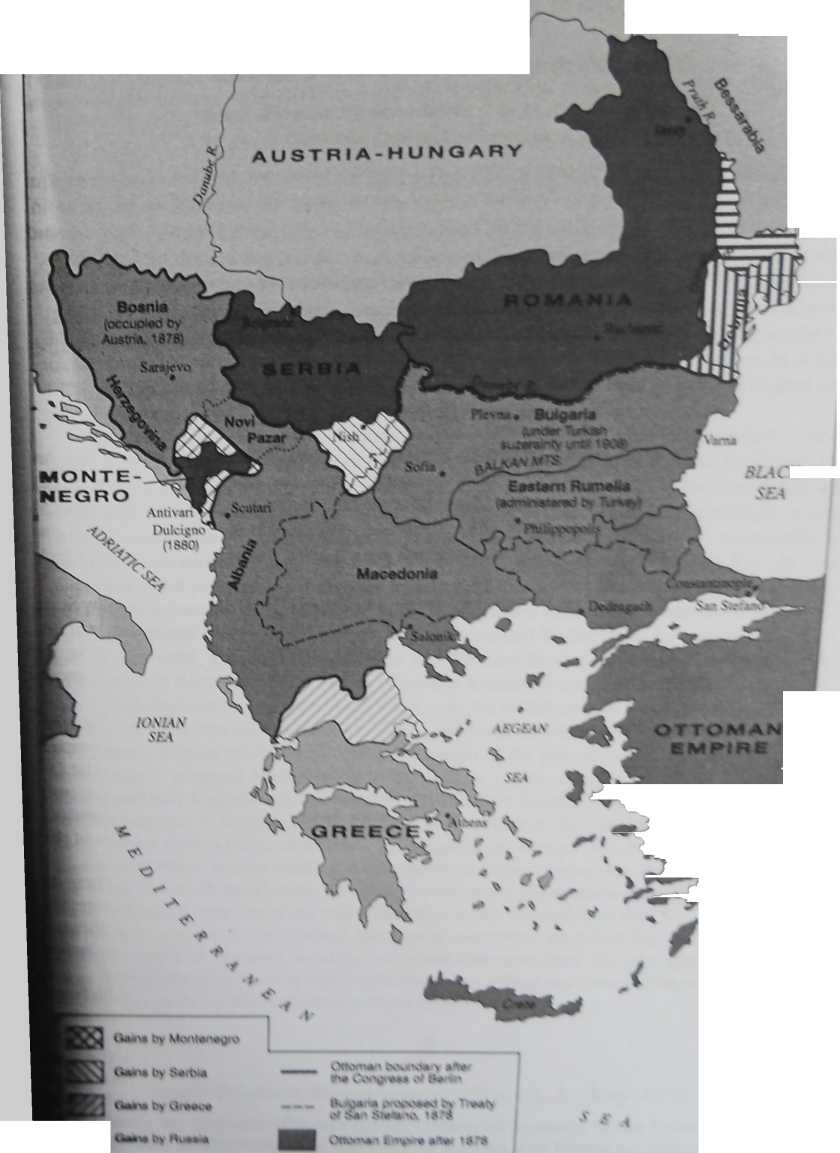kryzys bułgarski (4)
IW CHAPTER9
urn for our futurc than cithcr the rdationship of tlie Porte to its subjects or its reła-tionship to the European powers or both....
—PATilrkei I.A.B.q. 133 secr.
9.7 TREATY OF SAN STEFANO
Treaty of San Stefana* 19 Fsbntary/3 Marcb 18”8 •
Memorandum for tbe Britisb Gabinet, 3 May 18"8
The Russo-Turkish peace was signed in the Constantinople suburb of San Stefano, with the Russian achance force only a day's march from the Ottoman capital. The Russian negotiator was Count Nicholas Ignatiey, architect of the Treaty of Peking (Document 6.4d), who had served as Russia s ambassador in Constantinople between 1864 and 1877, and who now had "the chance of remodelling the Ottoman Empire according to his taste."20 Ignatiev seized this chance with gusto. His political orientation was decidedly Pan-Slav—a liability in his relations with his own fbreign ministry, given the cosmopolitan orientation of Gorchakov and the senior members ot the diplomatic corps. Ignatiev’s first mistake may have been to ignore Gorchakov's suggestion that tor now, to avert the suspicion of the other Great Powers, he conclude only a protocol rather than a full-fledged peace treaty. But far morę troubling questions were whether or how lgnatiev s treaty met Russia's obligations to Austria-Hungary under the Budapest con-vention (Document 9.5) and whether it allayed the fears of other powers. In lgnatiev's defense, it might be argued that the ‘Big Bułgaria" envisioned by the Treaty of San Stefano was to remain tributary to the Porte and hence would not be a "state" in the technical sense.

a) Treaty of San Stefana 19 February/3 Marcb 1878
Art. 2:The Sublimc Porte recogniz.es dctinitłvcly tlić Indcpcndcncc of the PrineM pality of Montcncgro. ..,
Art. 3: Serbia is rrcogniz.cd as independent..,.
Art 5:The Sublimc Porte rccogni/.cs the Indcpcndcncc of Koumania, which wiB establish its right to an łndemnity, to be dlscussed between the two countrics. ...
An (> Bułgaria is constituted an autononums tributary Principality, with a Chrisa
tian Govemmcnt and a national militia....
Art 7 The Princc of Bułgaria shall be frecly clectcd by the populaiion and etr tmned by the Sublimc Porte t with the assent of the Powers. No member of the ref mg dynastie* ot the great Buropean Powers shall be capablc of being clectcd Prlnc of Bułgaria In the cvent of the diguity of Princc of Bułgaria being vacan(. the cieci: ol tłu ncw Princc shall be nudę subjcct to the same condilions and forms. . . .
Art H Russian troops will occupy the country. . This occupation will Ik- hmiied to a term approximating to two ycars. ...
rtnees
An lo The Sublimc Porte Muli have the right to make usc ot Bułgaria tor tianspoit h> hxed mutes ol its troops, munitlons, and provisitms (o the pmvf yoitd the Prtm ipallty. and viCC vetsa
Suitft ira uff Bilkiflt, ret

by Rom***
tbif
lut HAtKA \s AFltK lHł IKŁ AlitS (V \<N SHt' «Ni* •*><’ •'•'*• N
Wyszukiwarka
Podobne podstrony:
kryzys bułgarski (6) 192 CHAPTER 9 the Imperial Govemment łs willing to conclude with the British Go
kryzys bułgarski 180 CHAPTER 9 told the Emperor AIexander as much, and he took both of my hands and
kryzys bułgarski (7) >00 CHAPTER 9Gladstone in Eiiinburgb. 17 Matxb 1880 W Tut has that fcielgn p
kryzysy marokańskie (12) >28 CHAPTER U Art. 4: Thcse officcrs and noncommissioned officcrs Jor a
kryzys bułgarski (1) k: CHAPTER 9 constitution: its first article affirmed the empire s territorial
więcej podobnych podstron